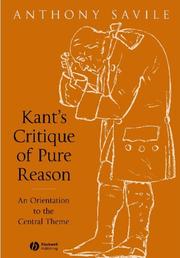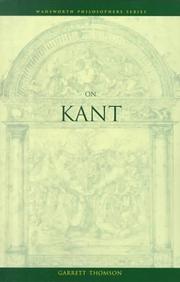| Listing 1 - 10 of 1572 | << page >> |
Sort by
|

ISBN: 140512041X 9781405120418 1405120401 9781405120401 Year: 2005 Publisher: Oxford Blackwell
Abstract | Keywords | Export | Availability | Bookmark
 Loading...
Loading...Choose an application
- Reference Manager
- EndNote
- RefWorks (Direct export to RefWorks)
Book
ISBN: 9780521883863 0521883865 0521710111 9780521710114 9780511781407 Year: 2010 Publisher: Cambridge Cambridge university press
Abstract | Keywords | Export | Availability | Bookmark
 Loading...
Loading...Choose an application
- Reference Manager
- EndNote
- RefWorks (Direct export to RefWorks)
"Immanuel Kant's Critique of pure reason, first published in 1781, is one of the landmarks of Western philosophy, a radical departure from everything that went before and an inescapable influence on all philosophy since its publication. In this massive work, Kant has three aims. First, he constructs a new theory of knowledge that delivers certainty about the fundamental principles of human experience at the cost of knowledge of how things are in themselves. Second, he delivers a devastating critique of traditional "speculative" metaphysics on the basis of his new theory of knowledge. Third, he suggests how the core beliefs of the Western metaphysical tradition that cannot be justified as theoretical knowledge can, nevertheless, be justified as objects of "moral faith" because they are the necessary conditions of the possibility of moral agency. Kant started this third project in the Critique of Pure Reason but would go on to complete it in two other works, Critique of Practical Reason and Critique of the Power of Judgment. The Cambridge Companion to Kant's Critique of pure reason is the first collective commentary on this work in English. The seventeen chapters have been written by an international team of scholars, including some of the best-known figures in the field as well as emerging younger talents. The first two chapters situate Kant's project against the background of Continental rationalism and British empiricism, the dominant schools of early modern philosophy. Eleven chapters then expound and assess all the main arguments of the Critique. Finally, four chapters recount the enormous influence of the Critique on subsequent philosophical movements, including German idealism and neo-Kantianism, twentieth-century Continental philosophy, and twentieth century Anglo-American analytic philosophy. The book concludes with an extensive bibliography"-- "The Cambridge Companion to Kant's Critique of pure reason is the first collective commentary on this work in English. The seventeen chapters have been written by an international team of scholars, including some of the best-known figures in the field as well as emerging younger talents. The first two chapters situate Kant's project against the background of Continental rationalism and British empiricism, the dominant schools of early modern philosophy. Eleven chapters then expound and assess all the main arguments of the Critique. Finally, four chapters recount the enormous influence of the Critique on subsequent philosophical movements, including German Idealism and Neo-Kantianism, twentieth-century Continental philosophy, and twentieth century Anglo-American analytic philosophy. The book concludes with an extensive bibliography"--

ISBN: 0534575919 Year: 2000 Publisher: Belmont (CA) : Wadsworth,
Abstract | Keywords | Export | Availability | Bookmark
 Loading...
Loading...Choose an application
- Reference Manager
- EndNote
- RefWorks (Direct export to RefWorks)

ISBN: 9780521108928 9780521833738 9780511584497 9780511266027 0511266022 9780511262159 0511262159 0511584490 0521833736 1139810138 110716091X 0511263759 0511317662 1299398863 0511265301 0511264585 Year: 2009 Publisher: Cambridge Cambridge University Press
Abstract | Keywords | Export | Availability | Bookmark
 Loading...
Loading...Choose an application
- Reference Manager
- EndNote
- RefWorks (Direct export to RefWorks)
This book is the first detailed study of Kant's method of 'transcendental reflection' and its use in the Critique of Pure Reason to identify our basic human cognitive capacities, and to justify Kant's transcendental proofs of the necessary a priori conditions for the possibility of self-conscious human experience. Kenneth Westphal, in a closely argued internal critique of Kant's analysis, shows that if we take Kant's project seriously in its own terms, the result is not transcendental idealism but (unqualified) realism regarding physical objects. Westphal attends to neglected topics - Kant's analyses of the transcendental affinity of the sensory manifold, the 'lifelessness of matter', fallibilism, the semantics of cognitive reference, four externalist aspects of Kant's views, and the importance of Kant's Metaphysical Foundations for the Critique of Pure Reason - that illuminate Kant's enterprise in new and valuable ways. His book will appeal to all who are interested in Kant's theoretical philosophy.
Multi
ISBN: 9781009031028 9781009013765 Year: 2023 Publisher: Cambridge Cambridge University Press
Abstract | Keywords | Export | Availability | Bookmark
 Loading...
Loading...Choose an application
- Reference Manager
- EndNote
- RefWorks (Direct export to RefWorks)
This work outlines a framework that aims to combine the systematic ambition of early twentieth-century readings of Kant's 'Opus postumum' with the rigour of more recent studies.
Book
Year: 1939 Publisher: Princeton : Princeton University Press,
Abstract | Keywords | Export | Availability | Bookmark
 Loading...
Loading...Choose an application
- Reference Manager
- EndNote
- RefWorks (Direct export to RefWorks)
Book
ISBN: 9780198854586 9780191888830 0192596772 Year: 2024 Publisher: Oxford : Oxford University Press,
Abstract | Keywords | Export | Availability | Bookmark
 Loading...
Loading...Choose an application
- Reference Manager
- EndNote
- RefWorks (Direct export to RefWorks)
Immanuel Kant (1724-1804) is a towering figure of modern Western philosophy, someone whose thought continues to exert an influence across all areas of the discipline. His work is characterized by both breadth and unity: he writes powerfully about mind, epistemology, metaphysics, logic, mathematics, natural science, ethics, politics, aesthetics, education, and more. And across those areas, his work is concerned with defending a view of human beings and their place in nature according to which our own reason enables us to discover and uphold the laws of nature and freedomthat is, to think for ourselves.The Oxford Handbook of Kant provides an up-to-date account of recent scholarship on Kant's philosophy, taking in all areas of his writings. It will be essential reading for students and researchers who want to think for themselves about the topics he wrote with such insight. The individual chapters to this Handbook each provide a scholarly analysis and assessment of some aspect of Kant's thought, and the collection ranges across all the areas to which Kant contributed. It collectively presents a picture of where the study of Kant's philosophy finds itself at this point in the twenty-first century.
Book
ISBN: 0719004063 0719004411 Year: 1970 Publisher: Manchester Manchester University Press
Abstract | Keywords | Export | Availability | Bookmark
 Loading...
Loading...Choose an application
- Reference Manager
- EndNote
- RefWorks (Direct export to RefWorks)
Book
ISBN: 9780415843454 9781135015633 9781135015619 9781135015626 9780415843447 Year: 2014 Volume: *2 Publisher: London ; New York Routledge
Abstract | Keywords | Export | Availability | Bookmark
 Loading...
Loading...Choose an application
- Reference Manager
- EndNote
- RefWorks (Direct export to RefWorks)
In this updated edition of his outstanding introduction to Kant, Paul Guyer uses Kant’s central conception of autonomy as the key to his thought.Beginning with a helpful overview of Kant’s life and times, Guyer introduces Kant’s metaphysics and epistemology, carefully explaining his arguments about the nature of space, time and experience in his most influential but difficult work, The Critique of Pure Reason. He offers an explanation and critique of Kant’s famous theory of transcendental idealism and shows how much of Kant’s philosophy is independent of this controversial doctrine.He then examines Kant’s moral philosophy, his celebrated ‘categorical imperative’ and his theories of duty, freedom of will and political rights. This section of the work has been substantially revised to clarify the relation between Kant’s conceptions of "internal" and "external" freedom. In his treatments of Kant’s aesthetics and teleology, Guyer focuses on their relation to human freedom and happiness. Finally, he considers Kant’s view that the development of human autonomy is the only goal that we can conceive for both natural and human history.Including a chronology, glossary, chapter summaries and up-to-date further reading, Kant, second edition is an ideal introduction to this demanding yet pivotal figure in the history of philosophy, and essential reading for all students of philosophy.
Book
ISBN: 9780415452533 9780415452526 041545252X 0415452538 Year: 2015 Publisher: London and New York : Routledge,
Abstract | Keywords | Export | Availability | Bookmark
 Loading...
Loading...Choose an application
- Reference Manager
- EndNote
- RefWorks (Direct export to RefWorks)
"The Neo-Kantian Reader is the first anthology to collect the most important primary sources in Neo-Kantian philosophy, with many being published here in English for the first time. It includes extracts on a rich and diverse number of subjects, including logic, epistemology, metaphysics, philosophy of science, and transcendental idealism. Sebastian Luft, together with other scholars, provides clear introductions to each of the following sections (to the authors as well as to each text), placing them in historical and philosophical context: the beginnings of Neo-Kantianism: including the work of Hermann von Helmholtz, Otto Liebman, Friedrich Lange, and Hermann Lotze; the Marburg School: including Hermann Cohen, Paul Natorp, and Ernst Cassirer; the Southwest School: including Wilhelm Windelband, Heinrich Rickert, Emil Lask, and Hans Vaihinger; responses and critiques: including Moritz Schlick, Edmund Husserl; Rudolf Carnap, and the 'Davos dispute' between Martin Heidegger and Ernst Cassirer."--Publisher description.
| Listing 1 - 10 of 1572 | << page >> |
Sort by
|

 Search
Search Feedback
Feedback About UniCat
About UniCat  Help
Help News
News